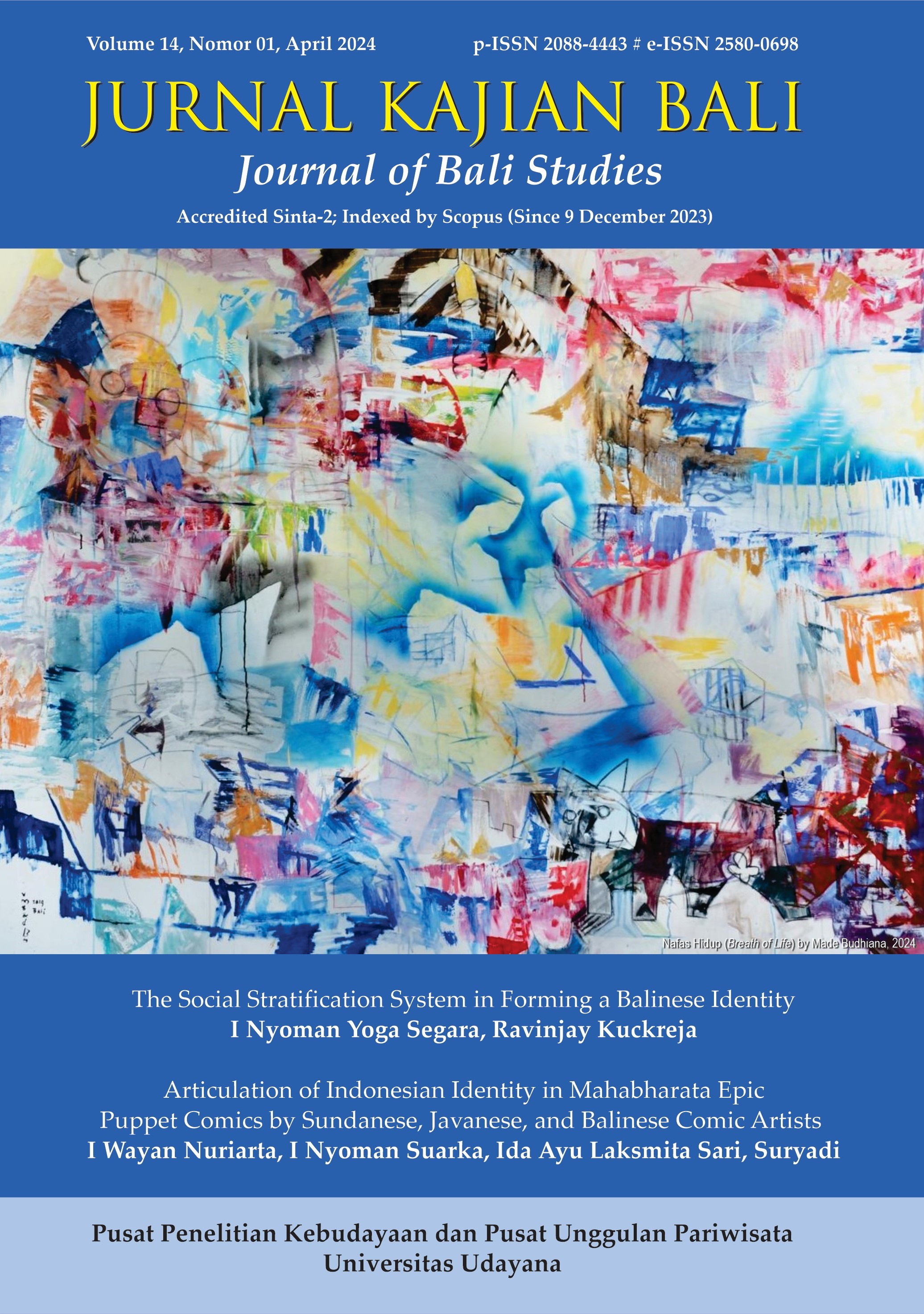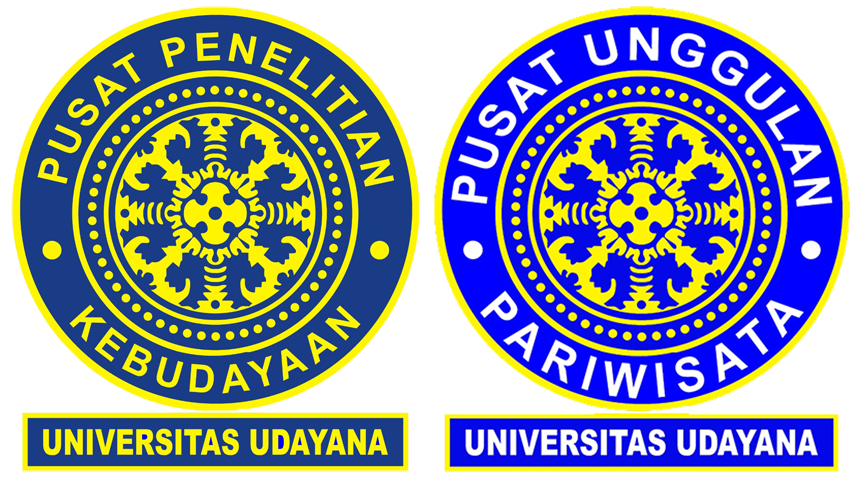Managing Restaurant’s Food Loss and Waste at The Aburi Sushi Bali: A Sustainable Culinary Tourism Enterprise Model in Bali
Abstract
Food loss and waste (FLW) is a global issue that affects the environment, economy, and society. It also poses a challenge for the sustainability of Japanese culinary tourism which is a growing sector in Bali. This study aims to explore how a sushi restaurant in Bali especially at The Aburi Sushi Bali manages its FLW and contributes to sustainable culinary tourism. The study adopts a qualitative case study approach, using semi-structured interviews, observation, and document analysis as data collection methods. The findings reveal that The Aburi Sushi implements various strategies to prevent, reduce, and recover FLW, such as inventory management, portion control, menu design, staff training, customer education, and food donation. The study also identifies the benefits and challenges of FLW management for the restaurant and its stakeholders. The study concludes that FLW management enhances the environmental, economic, and social sustainability of culinary tourism enterprises in Bali. It also provides implications and recommendations for practitioners and policymakers to improve FLW management practices in the culinary tourism sector
Downloads
References
Björk, P. & Kauppinen-Räisänen, H. (2014). Nutrition & Food Science. Vol. 44 No. 4, pp. 294-309. DOI: 10.1108/NFS-12-2013-0142
Braun, V., & Clarke, V. (2006). Using Thematic Analysis in Psychology. Qualitative Research in Psychology. 3(2), 77–101. DOI: https://doi.org/10.1191/1478088706qp063oa
Combe, C. (2022). Introduction to Global Sustainable Management. SAGE Publications Ltd.
Counihan, C. & Van Esterik, P. (2013). Food and Culture: a reader. Routledge.
Creswell, J. W. & Poth, C.N. (2018) Qualitative Inquiry and Research Design Choosing among Five Approaches. 4th Edition, SAGE Publications, Inc., Thousand Oaks.
Dopson, L. R., & Hayes, D. K. (2019). Food and Beverage Cost Control. Wiley.
Filimonau, V., Kadum, H., Mohammed, N. K., Algboory, H., Qasem, J. M., Ermolaev, V. A. & Muhialdin, B.J. (2022). Religiosity and food waste behavior at home and away, Journal of Hospitality Marketing & Management, 31:7, 797-818, DOI: 10.1080/19368623.2022.2080145.
FDA. (2021). Food Safety Modernization Act (FSMA). U.S. Food and Drug Administration. Retrieved from https://www.fda.gov/food/guidance-regulation-food-and-dietary-supplements/food-safety-modernization-act-fsma
Food Waste Reduction Alliance (2016). Analysis of U.S. Food Waste among Food Manufacturers, Retailers, and Restaurants. Retrieved from https://www.foodwastealliance.org/wp-content/uploads/2020/05/FWRA-Food-Waste-Survey-2016-Report_Final.pdf
Freedman, M.R. and Brochado, C. (2010), Reducing Portion Size Reduces Food Intake and Plate Waste. Obesity. No.18. DOI: https://doi.org/10.1038/oby.2009.480
Friman, A., Hyytiä, N. (2022). The Economic and Welfare Effects of Food Waste Reduction on a Food-Production-Driven Rural Region. Sustainability. No.14, DOI: https://doi.org/10.3390/su14063632
Galloway, J., & Hoek, J. (2019). The Routledge Handbook of Sustainable Food and Gastronomy. Routledge.
Gössling, S., Scott, D., & Hall, C. M. (2020). Tourism and Water. Channel View Publications.
Guest, G., MacQueen, K. M., & Namey, E. E. (2012). Applied thematic analysis. SAGE Publications, Inc., DOI: https://doi.org/10.4135/9781483384436
Gustavsson, J., Cederberg, C., Sonesson, U., van Otterdijk, R., & Meybeck, A. (2011). Global Food Losses and Food Waste: Extent, Causes and Prevention. Food and Agriculture Organization of the United Nations (FAO).
Hayes, D. K. & Ninemeier, J. D. (2015). Human Resources Management in the Hospitality Industry (2nd Edition.). Wiley.
Huang, W., Haller, W. J. and Ramshaw, G.P. (2013). Diaspora Tourism and Homeland Attachment: An Exploratory Analysis. Tourism Analysis, Vol. 18, No.3, pp. 285-296(12). DOI: https://doi.org/10.3727/108354213X13673398610691
Kim, M.J. & Hall, C.M. (2020). Can Sustainable Restaurant Practices Enhance Customer Loyalty? The Roles of Value Theory and Environmental Concerns. Journal of Hospitality and Tourism Management. Vol. 43, pp.127-138. https://doi.org/10.1016/j.jhtm.2020.03.004.
Kim, H. & Park, J. (2023). Quantification of Food Loss and Waste and Its Percentage Estimation Along the Food Supply Chain in Korea. Waste Management & Research. DOI: 10.1177/0734242X231178476
Kotler, P. & Armstrong, G. (2018) Principles of Marketing (17th Edition). Essex: Pearson Education Limited.
Kovalenko, A., Dias, Á., Pereira, L. & Simões, A. Culinary Experience and Consumer Behavior: Analyzing the Influence on Destination Image. Foods, Vol. 12, DOI: https://doi.org/10.3390/foods12020315
Lai, O. (2022). Composting Food to Reduce Food Waste. Retrieved from: https://earth.org/composting-food-to-reduce-food-waste/
Lee, K. (2023). Cooking up food memories: A taste of intangible cultural heritage, Journal of Hospitality and Tourism Management, Vol. 54, pp.1-9,
DOI: https://doi.org/10.1016/j.jhtm.2022.11.005.
Lee, H. S., Gao, Y., & Kim, Y. (2018). A Study on the Factors Influencing the Intention to Use Smartphone Applications for Food Waste Reduction in the Restaurant Industry. Sustainability. Vol. 10, No.9, pp.3173.
Legrand, W., Sloan, P. & Chen, J.S. (2017). Sustainability in the Hospitality Industry: Principles of Sustainable Operations. Routledge.
Luo, N.; Olsen, T.L.; Liu, Y. (2021). A Conceptual Framework to Analyze Food Loss and Waste within Food Supply Chains: An Operations Management Perspective. Sustainability. Vol.13, No.927. DOI: https://doi.org/10.3390/su13020927
Martin, J. R., & Steele, P. (2016). Food Tourism: A Practical Marketing Guide. CABI.
Mathiesen, S.L., Hopia, A., Ojansivu, P., Byrne, D.V. and Wang, Q.J. (2022). The sound of silence: Presence and absence of sound affects meal duration and hedonic eating experience. Appetite. Vol 174. DOI: https://doi.org/10.1016/j.appet.2022.106011
Moggi, S.; Bonomi, S.; Ricciardi, F. (2018). Against Food Waste: CSR for the Social and Environmental Impact through a Network-Based Organizational Model. Sustainability. Vol. 10, No.3515. https://doi.org/10.3390/su10103515
Mohanty, P. P., Tiwari, S. & Nair, B. B. (2022): Analysing Food Innovation Drivers: Chefs’ Perspectives., Journal of Culinary Science & Technology. DOI: 10.1080/15428052.2022.2036661
Nurita, W., Shishido, K. & Mudana, I G. (2018). Aikido in Bali: Japanese Cultural Diplomacy and Its Relationship with Tourism Business. International Journal of Applied Sciences in Tourism and Events. Vol.2 No.1.
Parasuraman, A., Zeithaml, V. A., & Berry, L. L. (1988). SERVQUAL: A multiple-item scale for measuring consumer perceptions of service quality. Journal of Retailing, 64(1), 12-40.
Quested, T. E., Marsh, E., Stunell, D., & Parry, A. D. (2013). Spaghetti soup: The complex world of food waste behaviours. Resources, Conservation and Recycling, 79, 43-51.
Riesenegger, L. & Hübner, A.(2022). Reducing Food Waste at Retail Stores—An Explorative Study. Sustainability. 14, 2494. DOI: https://doi.org/10.3390/su14052494
Sharma, A., Jolly, P. M., Chiles, R. M., DiPietro, R. B., Jaykumar, A., Kesa, H., Monteiro, H., Roberts, K., & Saulais, L. (2022). Principles of foodservice ethics: A general review. International Journal of Contemporary Hospitality Management. Vo.34, Vol. 1, pp.135–158. DOI: https://doi.org/10.1108/IJCHM-12-2020-1486
Sprenger, R. A. (2018). Managing Food Safety: A Manual for the Voluntary Use of HACCP Principles for Operators of Food Service and Retail Establishments (5th ed.). FDA.
Stangherlin, I.D.C. & Barcellos, M.D.D. (2018) "Drivers and barriers to food waste reduction", British Food Journal, Vol. 120 Issue: 10, pp.2364-2387, DOI: https://doi.org/10.1108/BFJ-12-2017-0726
Sthapit, E. Piramanayayagam, S. and Björk, P. (2020). Tourists' Motivations, Emotions, and Memorable Local Food Experiences. Journal of Gastronomy and Tourism, Vol. 5, No. 1, pp. 17-32. DOI: https://doi.org/10.3727/216929720X15968961037881
Subadra, I N. (2024). Cloud Tour Services in Paradise: A Newly Marketing Paradigm in Bali Tourism History. In Shem Wambugu Maingi, S.W., Gowreesunkar V.G.B and Korstanje, M.E. Maximiliano E. K. (Eds). Tourist Behaviour and the New Normal, Volume I. Springer Nature. DOI: https://doi.org/10.1007/978-3-031-45848-4
Subadra, I N. (2022). Understanding the cultural ecosystem service of heritage tourism: the case of Jatiluwih Heritage Tourism. In: V.B.B. Gowreesunkar, S.W. Maingi, F.L.M. Ming'ate (Eds). Management of Tourism Ecosystem Services in a Post Pandemic Context. London: Routledge.
Subadra, I N. (2021). Pariwisata Budaya dan Pandemi Covid-19: Memahami Kebijakan Pemerintah dan Reaksi Masyarakat Bali. Jurnal Kajian Bali (Journal of Bali Studies), Vol. 11, No. 1, p. 1-22. DOI: https://doi.org/10.24843/JKB.2021.v11.i01.p01.
Subadra, I. N., Sutapa, I. K., Artana, I. W. A., Yuni, L. H. K., & Sudiarta, M. (2019). Investigating push and pull factors of tourists visiting Bali as a World tourism destination. International Journal of Multidisciplinary Education Research, Vol. 8, pp.235-269.
Subadra, I N. (2019). Gaining In-Depth Understanding Through Mixed Methods Case Study: An Empirical Research from Temple Tourism in Bali Research Method Cases. London: Sage Publication.
Subadra, I N. (2015). Preserving the Sanctity of Temple Sites in Bali: Challenges from Tourism. Lincoln (United Kingdom): PhD Thesis. University of Lincoln.
Subadra, I N. (2006). Ekowisata Hutan Mangrove dalam Pembangunan Pariwisata Berkelanjutan: Studi Kasus di Kawasan Mangrove Information Center (MIC), Desa Pemogan, Kecamatan Denpasar Selatan, Kota Denpasar. Tesis. Universitas Udayana.
Subadra, I N. & Nandra, N.M. (2006). Dampak Ekonomi, Sosial-Budaya dan Lingkungan Pengembangan Desa Wisata di Jatiluwih Tabanan. Jurnal Manajamen Pariwisata .Vol.5, No.1
Sundin, N., Osowski, C.P., Strid, I. and Eriksson, M. (2022). Surplus food donation: Effectiveness, carbon footprint, and rebound effect. Resources, Conservation and Recycling, Volume 181, DOI: https://doi.org/10.1016/j.resconrec.2022.106271.
Talwar, S., Kaur, P., Yadav, R., Sharma, R. & Dhir, A. (2023). Food waste and out-of-home-dining: antecedents and consequents of the decision to take away leftovers after dining at restaurants. Journal of Sustainable Tourism, Vol.31, No1, pp.47-72, DOI: 10.1080/09669582.2021.1953512
Teng, C., Wang, Y., Cheng, Y. & Wang, S. (2023) Religious beliefs and food waste prevention practices: mechanisms of divine and environmental awareness. Journal of Hospitality Marketing & Management, Vol. 32 No.4, pp.530-554, DOI: 10.1080/19368623.2023.2189199.
Tomasella, B., Ali, A. & Gill, D. (2023): Hospitality that cares: a qualitative investigation into small foodservice businesses’ social responsibility Current Issues in Tourism. DOI: 10.1080/13683500.2023.2214849
Tripadvisor (2024). Restoran Jepang di Bali. Retrieved from https://www.tripadvisor.co.id/Restaurants-g294226-c27-Bali.html
UNESCO (2012). Cultural Landscape of Bali Province: the Subak System as a Manifestation of the Tri Hita Karana Philosophy. Retrieved from https://whc.unesco.org/en/list/1194/
UNWTO (2015). Do you know all 17 SDGs? Retrieved from https://sdgs.un.org/goals
UNWTO (2017). Second Global Report on Gastronomy Tourism. Retrieved from https://www.e-unwto.org/doi/pdf/10.18111/9789284418701
UNWTO. (2019). Sustainable Development of Tourism. United Nations World Tourism Organization. Retrieved from https://www.unwto.org/sustainable-development-tourism
UNWTO (2023). Tourism and Green Investments. Retrieved from https://www.unwto.org/world-tourism-day-2023?utm_source=unwt&utm_medium=64
UNWTO (2023). 8TH UNWTO WORLD FORUM ON GASTRONOMY TOURISM. Retrived from https://www.unwto.org/8-unwto-world-forum-gastronomy-tourism.
Valverde-Roda, J., Viruel, M.J. M., Prieto, L.C. & Sanchez, M.A.S. (2022). Interests, motivations and Culinary Experiences in the world heritage site destination of Granada (Spain): satisfaction analysis. British Food Journal. Vol. 125 No. 13, pp. 61-80. DOI: 10.1108/BFJ-07-2021-0830.
Wang, Y., Yuan, Z. and Tang, Y. (2021). Enhancing food security and environmental sustainability: A Critical Review of Food Loss and Waste Management. Resources, Environment and Sustainability. Volume 4. DOI: https://doi.org/10.1016/j.resenv.2021.100023.
Yin, R. K. (2018). Case Study Research Design and Methods. Thousand Oaks CA: Sage.
Zeithaml, V. A., Bitner, M. J., & Gremler, D. D. (2018). Services Marketing: Integrating Customer Focus Across the Firm. McGraw-Hill Education.

This work is licensed under a Creative Commons Attribution 4.0 International License.



















